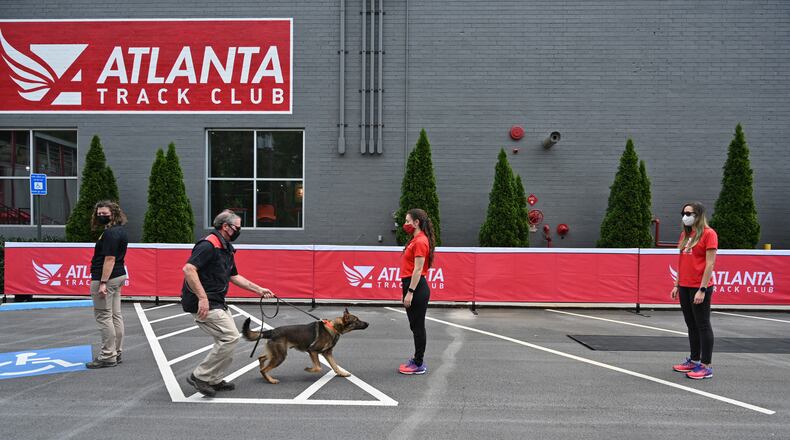To safely put on the Atlanta Journal-Constitution Peachtree Road Race, the Atlanta Track Club already made the decision to hold the Independence Day tradition across two days, July 3-4. Tuesday, track club officials introduced a furrier element of its efforts to stage the 10-kilometer road race free of COVID-19 – a frisky 14-month-old German shepherd named Lord.
The club will deploy a team of dogs trained to detect people with COVID-19 infections, both at the pre-race expo and then again on race day. The company that the track club has contracted with, 360K9, said that the dogs were found to have detected infected people with 99% accuracy in double-blind studies.
“If there’s any chance that you have COVID or have been exposed to COVID or are shedding virus, you will not be able to get to the start line, and we feel very good about that,” track club executive director Rich Kenah said.
Credit: HYOSUB SHIN / AJC
Credit: HYOSUB SHIN / AJC
Last year, COVID-19 necessitated the track club to postpone and modify the tradition-bound event to a virtual format run on Thanksgiving Day weekend – the first time it hadn’t been run on July 4 since its founding in 1970. Track-club officials felt compelled to find a safe way to stage the race on Independence Day this year, even as other large-scale road races were pushing their races to later in the year.
“We said, ‘Hey, rather than worry about how big we can be, let’s just make sure we do it on the weekend of the Fourth of July,’” Kenah said “So that’s how we looked at it.”
Reducing the field size and spreading out the race over two days were two significant changes to the format. The COVID-sniffing dogs are an added measure to provide a safe atmosphere and also perhaps give runners and walkers considering taking part another measure of confidence to join in with the heavy-breathing thousands making the hilly journey down Peachtree Road.
Kenah said that would-be participants “can register for this event knowing that you’re going to be well taken care of.”
In the track club parking lot, the club put on a demonstration for media. A 360K9 official held an implement about the size of a ping-pong ball carrying a scent produced by a person infected by COVID-19. With a handler holding him on leash, Lord quickly sniffed the hands of a row of volunteers before sitting down at the feet of the staff member before being rewarded with an enthusiastic “You’re such a good boy!” and a chance to play with a pull toy.
“We’re very confident that if you have COVID, they’ll find it,” said William Schneider, chief research scientist for 360K9. “And not only will they find it, they’ll find it in asymptomatic people.”
Credit: HYOSUB SHIN / AJC
Credit: HYOSUB SHIN / AJC
At the expo and on race day, participants who have been vaccinated and can show proof of their immunization will be granted accelerated entry. Those who have not will be subject to sniffing from Lord and his cohorts. Registrants whom the dogs identify will then be asked to take a rapid COVID test at no charge. Those who test positive can either get a refund of their entry fee or switch to a virtual Peachtree.
The 360 K9 dogs have served at other large-scale events, such as a music festival in Texas and Miami Heat games, and not encountered problems, Schneider said.
The race has been capped at 60,000 since 2011, making it the world’s largest 10K. Even with the race being held over two days – fortuitously, July 3-4 fall on Saturday and Sunday this year – the total cap will be significantly lower this year to allow for social distancing. The actual number will be determined by the track club in conjunction with the City of Atlanta. Kenah said that registration, which closes Saturday, has reached a point that he believes some registrants will be turned away.
“We’re not doing this to get to 60,000,” Kenah said of running the Peachtree over two days. “We’re trying to do this so that we have the appropriate amount of space and spacing in between people as they participate.”
Starting groups, typically as large as 3,000 runners and walkers, will be reduced to a maximum of about 1,500. The holding areas for each start group will be large enough for each participant to have his or her own 36 square feet of space. Where the groups have started about five minutes apart, the waves will now be separated by about 10 minutes, allowing participants much more space on the race course.
Credit: HYOSUB SHIN / AJC
Credit: HYOSUB SHIN / AJC
Participants will be asked to wear masks from the time they arrive for the race until they cross the start line, at which point they can unmask. When they reach the finish line, they’ll be expected to mask up again; the race bibs will come with masks contained in watertight pouches.
Piedmont Park, where family and friends have traditionally waited for finishers, will be limited only to race participants.
About the Author
More In This Series
Minnesota lawmaker convicted of felony burglary for breaking into estranged stepmother’s home
17-year-old charged with murder in paddleboarder's killing at a pond in rural Maine
Trump administration seeks release of Epstein grand jury records but not Justice Department files
Sweet Tea: Black family reunions go deep




